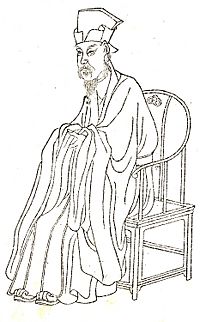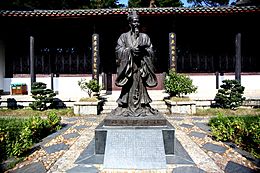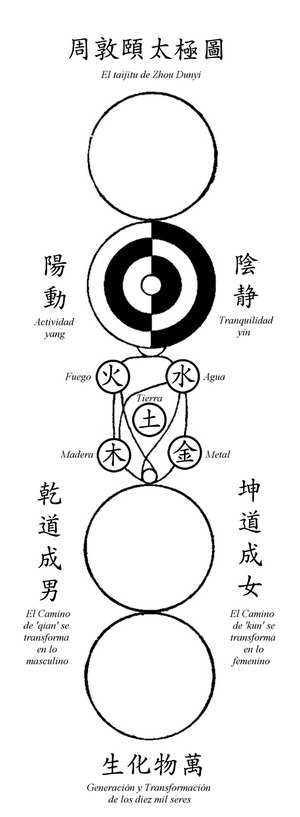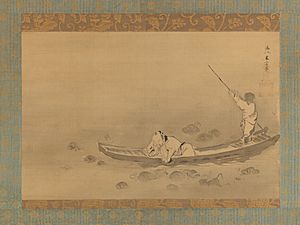Zhou Dunyi facts for kids
Quick facts for kids
Zhou Dunyi
|
|
|---|---|
 |
|
| Born | 1017 |
| Died | 1073 (age 56) |
| Era | Neo-Confucianism |
| Region | Chinese Philosophy |
| School | Neo-Confucianism |
| Zhou Dunyi | |||||||||
|---|---|---|---|---|---|---|---|---|---|

Bronze statue of Zhou Dunyi at the White Deer Grotto Academy
|
|||||||||
| Traditional Chinese | 周敦頤 | ||||||||
| Simplified Chinese | 周敦颐 | ||||||||
|
|||||||||
| Birth name | |||||||||
| Chinese | 周敦實 | ||||||||
|
|||||||||
| Courtesy name | |||||||||
| Chinese | 茂叔 | ||||||||
|
|||||||||
| Posthumous name | |||||||||
| Chinese | 周濂溪 | ||||||||
|
|||||||||
Zhou Dunyi (Chinese: 周敦頤; Wade–Giles: Chou Tun-i; 1017–1073) was an important Chinese thinker during the Song Dynasty. He was a philosopher, someone who studied the universe (a cosmologist), and a writer. He helped shape a new way of thinking called Neo-Confucianism.
Zhou Dunyi explored how human actions connect with the big forces of the universe. He believed people could control their qi (which means "vital life energy") to live in harmony with nature. He greatly influenced Zhu Xi, who later became a very famous Neo-Confucian thinker. Zhou Dunyi focused on ideas like Taiji (the "supreme ultimate") and Wuji (the "limitless potential"). He also studied the yin and yang and the wu xing (the "five phases" or elements). He is also known for helping to make the taijitu (the "yin-yang symbol") popular.
Contents
Life Story of Zhou Dunyi
Early Life and Name Change
Zhou Dunyi was born in 1017 in a place called Yingdao County, which is now part of Yongzhou, China. His birth name was Zhou Dunshi. He grew up in a family where his father was a scholar and government official. In 1063, he changed his name to Zhou Dunyi. This was done to avoid using a character that was part of the new Emperor Yingzong's personal name.
His Career and Later Years
When Zhou Dunyi was fourteen, his father passed away. His uncle, Zheng Xiang, then took him in. His uncle also helped him get his first job in the government. Even though he worked hard in his civil service career, he never reached a very high position. He also never earned the special "Presented Scholar" degree (called jinshi).
He held different jobs, like a district record keeper and a magistrate in various areas. He also worked as a staff supervisor and a professor. He left his last job a year before he died in 1073. He passed away near Mount Lu in Jiangxi province. After he died, people often called him Zhou Lianxi. This name came from a stream called Lian near his home, which he honored during his retirement.
Zhou Dunyi's Writings
Understanding the Taiji Tushuo
One of Zhou Dunyi's most important writings is called the Taiji Tushuo. This title means "Explanations of the Diagram of the Supreme Ultimate." Later, in 1175, this work was placed at the beginning of a famous collection of Neo-Confucian writings.
In this book, Zhou Dunyi combined ideas from Confucianism and the Book of Changes (an ancient Chinese text) with ideas about nature from Taoism. He created a way of thinking that said "the many are ultimately one and the one is ultimate." This means that everything in the universe comes from a single source.
The Taiji Tushuo was one of the first Chinese texts to explain that understanding the universe and living a good life are connected. It was also the first major Chinese text to explore the idea of the taijitu, which is the "yin-yang symbol."
His theory of how the world was created can be explained simply:
- In the beginning, there was Taiji (the "great ultimate"). This was also like Wuji (the "ultimate of non-being" or limitless potential).
- Because Taiji had so much energy, it started to move. This movement created yang (the positive force).
- When yang reached its peak, it became still. This stillness created yin (the negative force).
- Yin and yang then created each other, moving between activity and stillness.
- From the joining of yin and yang, the five elements (or "agents") came into being: metal, wood, water, fire, and earth. These are like basic building blocks for everything.
- The way yin and yang interact, along with different combinations of these five elements, creates all things in the world. This process never stops.
Zhou Dunyi believed that humans receive these universal qualities in the best way. This makes humans the most intelligent of all living things. He also thought that the five elements were directly connected to five important moral principles: ren (kindness), yi (fairness), li (good manners), zhi (wisdom), and xin (trustworthiness).
Exploring the Tong Shu
The Tong Shu means "The All-Embracing Book." In this work, Zhou Dunyi looked at Confucian ideas in a new way. This book became very important for understanding ethics (right and wrong) in Neo-Confucianism.
It explained that a "sage" (a very wise and good person) is someone who acts according to principles like good manners, kindness, fairness, wisdom, trustworthiness, calmness, and honesty. Honesty, he believed, was the foundation of a good moral character. It helps people tell good from evil and improve themselves.
The Tong Shu also talked about "principle," "nature," and "destiny" together. These became three very important ideas in Confucian thought. Zhou Dunyi also had a peaceful view of nature, similar to Taoist ideas. There are stories that he loved his grass so much he wouldn't cut it. This shows his belief that humans should value life in nature and the importance of not interfering too much. Zhou Dunyi famously said that the best way to live is like a pure lotus flower growing out of muddy water. The lotus represents a noble person who stays pure even in a difficult world. He took many ideas from Taoism, Buddhism, and Confucianism.
Zhou Dunyi's School and Influence
Zhou Dunyi had only two students who made big contributions to Confucianism: his nephews Cheng Yi and Cheng Hao. The Cheng brothers studied with him for a short time when they were young. These brothers later started the Cheng-Zhu School, which was the main way of thinking in Chinese philosophy for over 700 years. Zhou Dunyi is seen as the founder of this school, even though the Cheng brothers didn't often mention his specific contributions in their writings.
Zhou Dunyi was a huge influence on Zhu Xi, who is considered one of the most important Confucian thinkers after Confucius himself. Zhu Xi said that Zhou Dunyi was the first great wise person of the Song Dynasty. He especially praised Zhou Dunyi for focusing on the idea of Wuji (limitless potential).
Even though Zhou Dunyi didn't have a lot of influence during his own lifetime, people remembered him as a warm, kind person who loved the natural world. Many Confucians believed he truly showed the quality of "authenticity." He had a deep understanding of the "Way of Heaven." He is also given credit for helping to make the taijitu symbol widely known. This symbol (in a slightly changed form) is now famous around the world as the "yin-yang" symbol.
Images for kids
See also
 In Spanish: Zhou Dunyi para niños
In Spanish: Zhou Dunyi para niños






